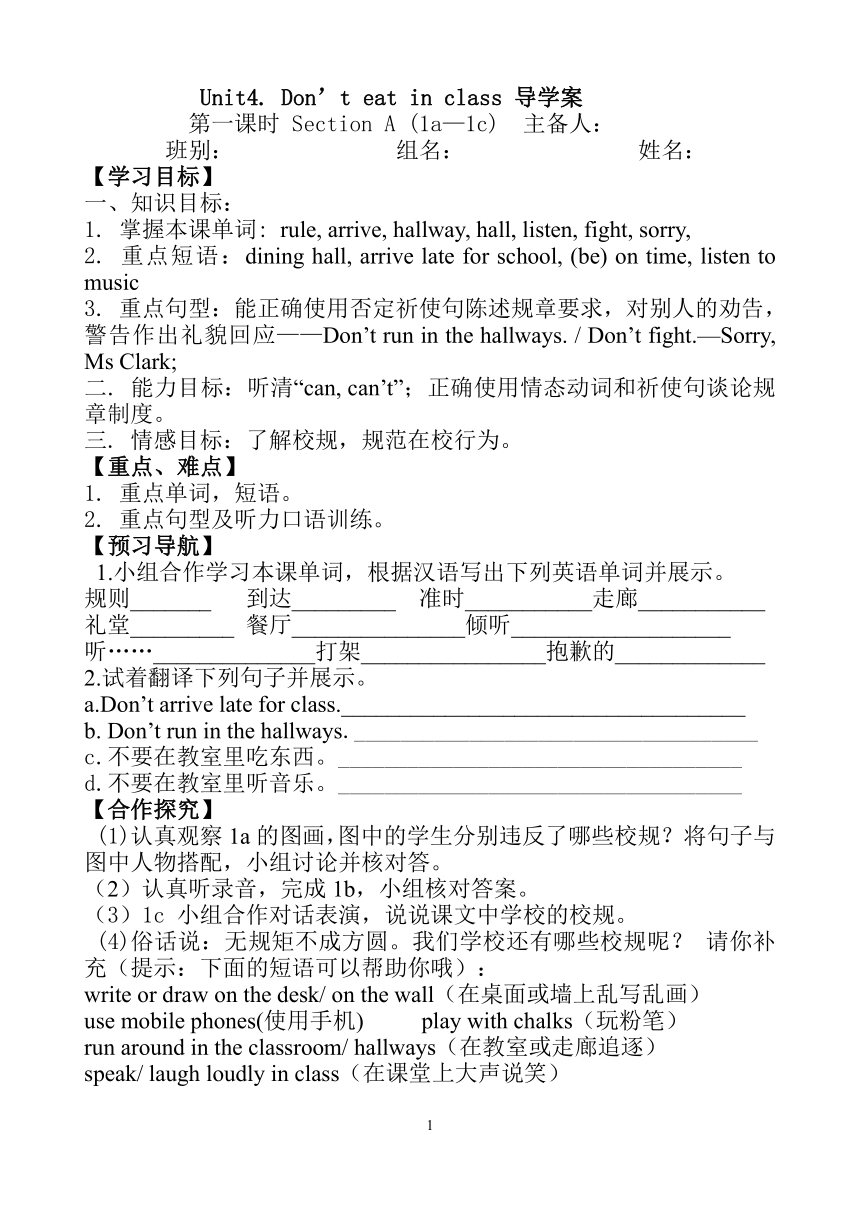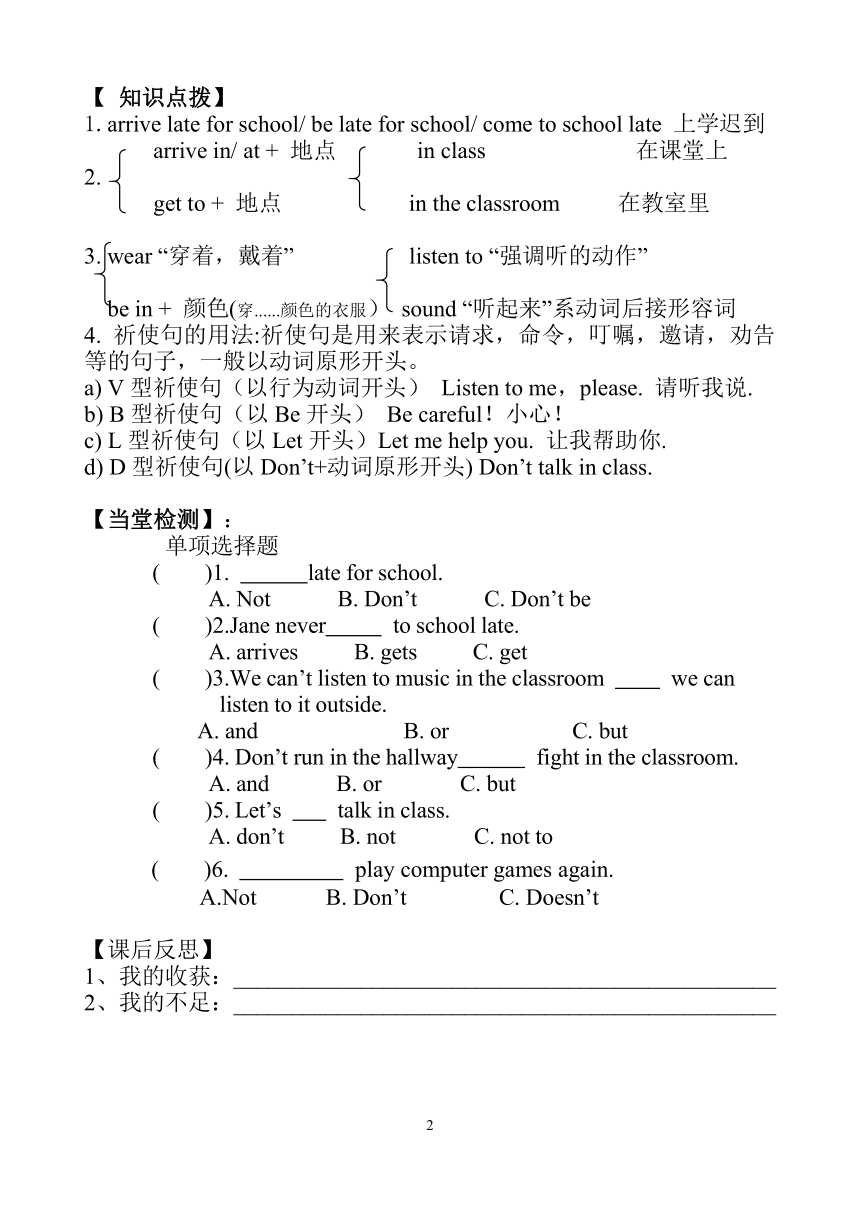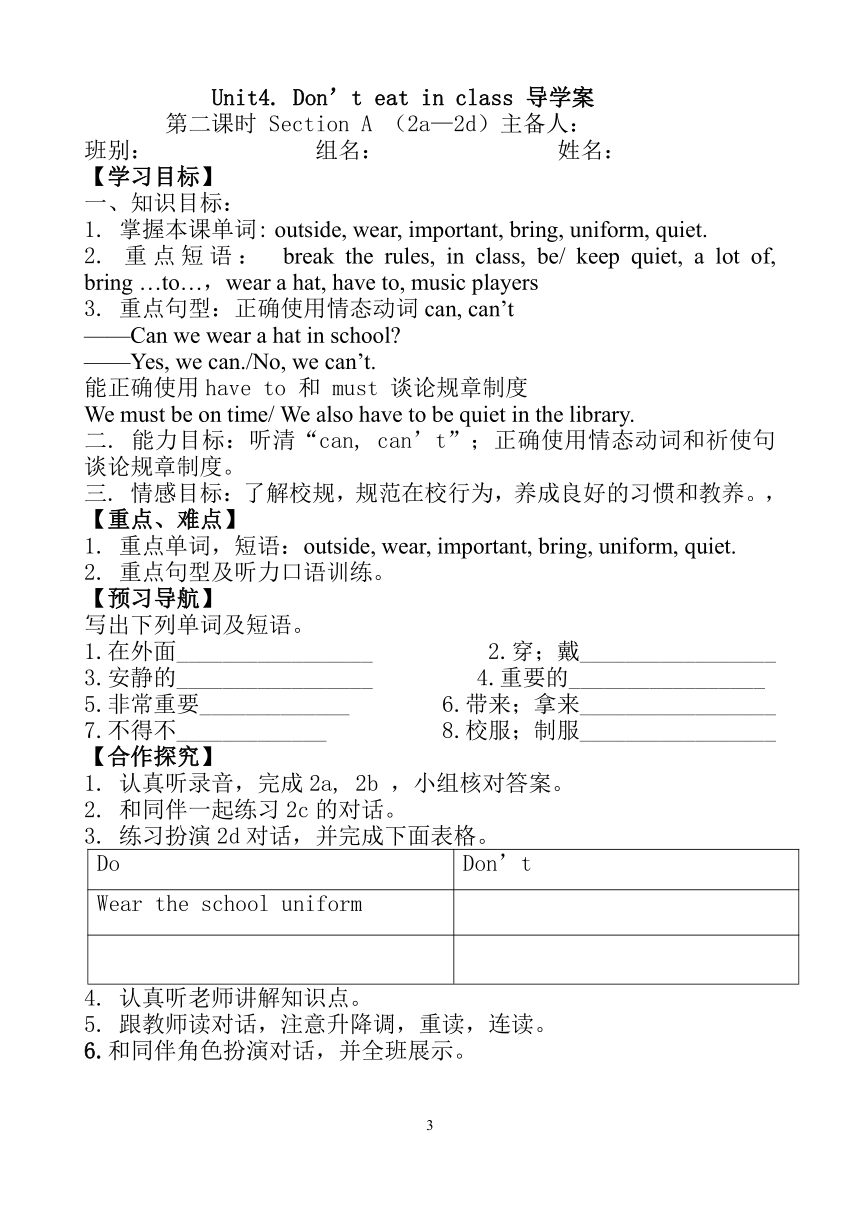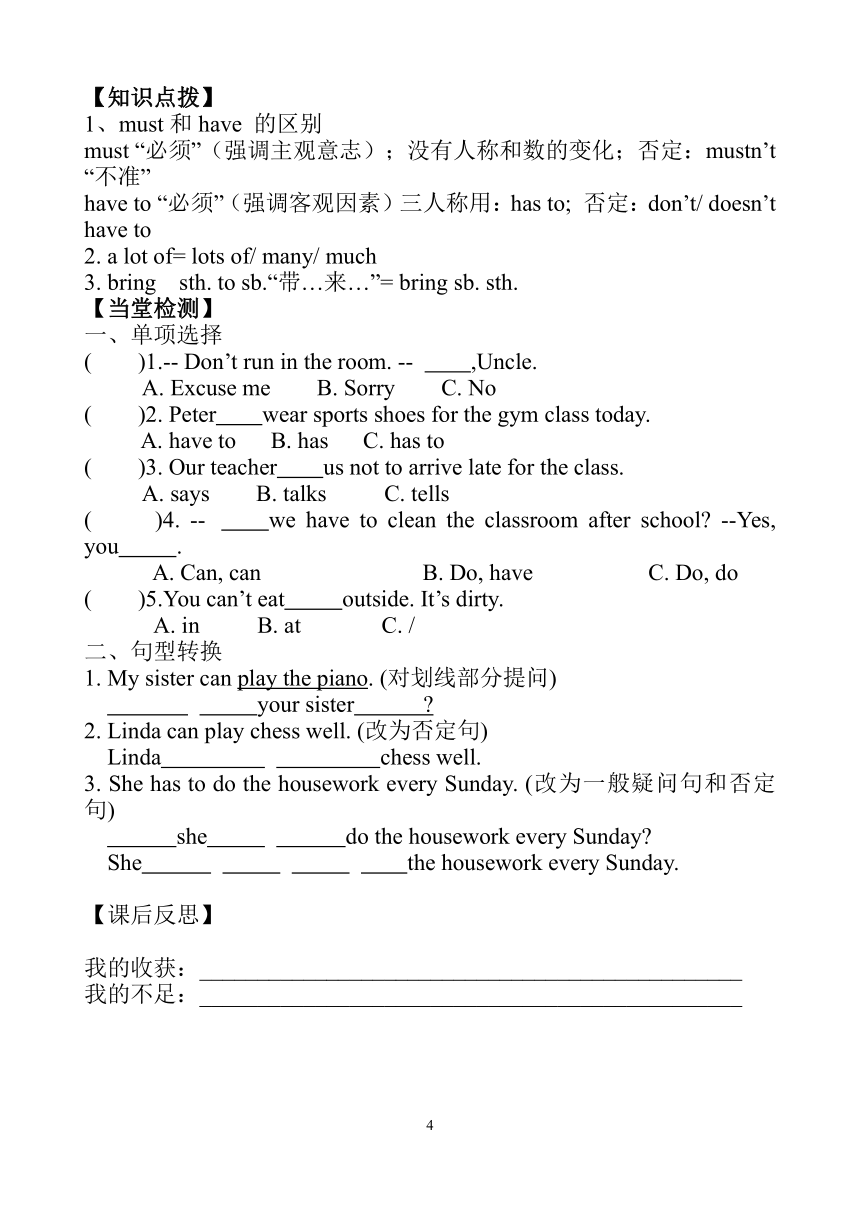Unit 4 Don’t eat in class.单元导学案(4课时)
文档属性
| 名称 | Unit 4 Don’t eat in class.单元导学案(4课时) |  | |
| 格式 | zip | ||
| 文件大小 | 21.1KB | ||
| 资源类型 | 教案 | ||
| 版本资源 | 人教新目标(Go for it)版 | ||
| 科目 | 英语 | ||
| 更新时间 | 2015-04-23 08:26:12 | ||
图片预览




文档简介
Unit4. Don’t eat in class 导学案
第一课时 Section A (1a—1c) 主备人:
班别: 组名: 姓名:
【学习目标】
一、知识目标:
1. 掌握本课单词: rule, arrive, hallway, hall, listen, fight, sorry,
2. 重点短语:dining hall, arrive late for school, (be) on time, listen to music
3. 重点句型:能正确使用否定祈使句陈述规章要求,对别人的劝告,警告作出礼貌回应——Don’t run in the hallways. / Don’t fight.—Sorry, Ms Clark;
二. 能力目标:听清“can, can’t”;正确使用情态动词和祈使句谈论规章制度。
三. 情感目标:了解校规,规范在校行为。
【重点、难点】
1. 重点单词,短语。
2. 重点句型及听力口语训练。
【预习导航】
1.小组合作学习本课单词,根据汉语写出下列英语单词并展示。
规则_______ 到达_________ 准时___________走廊___________
礼堂_________ 餐厅_______________倾听___________________
听……______________打架________________抱歉的_____________
2.试着翻译下列句子并展示。
a.Don’t arrive late for class.___________________________________
b. Don’t run in the hallways.___________________________________
c.不要在教室里吃东西。___________________________________
d.不要在教室里听音乐。___________________________________
【合作探究】
(1)认真观察1a的图画,图中的学生分别违反了哪些校规?将句子与图中人物搭配,小组讨论并核对答。
(2)认真听录音,完成1b,小组核对答案。
(3)1c 小组合作对话表演,说说课文中学校的校规。
(4)俗话说:无规矩不成方圆。我们学校还有哪些校规呢? 请你补充(提示:下面的短语可以帮助你哦):
write or draw on the desk/ on the wall(在桌面或墙上乱写乱画)
use mobile phones(使用手机) play with chalks(玩粉笔)
run around in the classroom/ hallways(在教室或走廊追逐)
speak/ laugh loudly in class(在课堂上大声说笑)
【 知识点拨】
1.arrive late for school/ be late for school/ come to school late 上学迟到
arrive in/ at + 地点 in class 在课堂上
2.
get to + 地点 in the classroom 在教室里
3. wear “穿着,戴着” listen to “强调听的动作”
be in + 颜色(穿......颜色的衣服) sound “听起来”系动词后接形容词
4. 祈使句的用法:祈使句是用来表示请求,命令,叮嘱,邀请,劝告等的句子,一般以动词原形开头。
a) V型祈使句(以行为动词开头) Listen to me,please. 请听我说.
b) B型祈使句(以Be开头) Be careful!小心!
c) L型祈使句(以Let开头)Let me help you. 让我帮助你.
d) D型祈使句(以Don’t+动词原形开头) Don’t talk in class.
【当堂检测】:
单项选择题
( )1. late for school.
A. Not B. Don’t C. Don’t be
( )2.Jane never to school late.
A. arrives B. gets C. get
( )3.We can’t listen to music in the classroom we can
listen to it outside.
A. and B. or C. but
( )4. Don’t run in the hallway fight in the classroom.
A. and B. or C. but
( )5. Let’s talk in class.
A. don’t B. not C. not to
( )6. play computer games again.
A.Not B. Don’t C. Doesn’t
【课后反思】
我的收获:_______________________________________________
我的不足:_______________________________________________
Unit4. Don’t eat in class 导学案
第二课时 Section A (2a—2d)主备人:
班别: 组名: 姓名:
【学习目标】
一、知识目标:
1. 掌握本课单词: outside, wear, important, bring, uniform, quiet.
2. 重点短语: break the rules, in class, be/ keep quiet, a lot of, bring …to…,wear a hat, have to, music players
3. 重点句型:正确使用情态动词can, can’t
——Can we wear a hat in school
——Yes, we can./No, we can’t.
能正确使用have to 和 must 谈论规章制度
We must be on time/ We also have to be quiet in the library.
二. 能力目标:听清“can, can’t”;正确使用情态动词和祈使句谈论规章制度。
三. 情感目标:了解校规,规范在校行为,养成良好的习惯和教养。,
【重点、难点】
1. 重点单词,短语:outside, wear, important, bring, uniform, quiet.
2. 重点句型及听力口语训练。
【预习导航】
写出下列单词及短语。
1.在外面_________________ 2.穿;戴_________________
3.安静的_________________ 4.重要的_________________
5.非常重要_____________ 6.带来;拿来_________________
7.不得不_____________ 8.校服;制服_________________
【合作探究】
认真听录音,完成2a, 2b ,小组核对答案。
和同伴一起练习2c的对话。
3. 练习扮演2d对话,并完成下面表格。
Do Don’t
Wear the school uniform
4. 认真听老师讲解知识点。
5. 跟教师读对话,注意升降调,重读,连读。
6.和同伴角色扮演对话,并全班展示。
【知识点拨】
1、must和have 的区别
must “必须”(强调主观意志);没有人称和数的变化;否定:mustn’t “不准”
have to “必须”(强调客观因素)三人称用:has to; 否定:don’t/ doesn’t have to
2. a lot of= lots of/ many/ much
3. bring sth. to sb.“带…来…”= bring sb. sth.
【当堂检测】
一、单项选择
( )1.-- Don’t run in the room. -- ,Uncle.
A. Excuse me B. Sorry C. No
( )2. Peter wear sports shoes for the gym class today.
A. have to B. has C. has to
( )3. Our teacher us not to arrive late for the class.
A. says B. talks C. tells
( )4. -- we have to clean the classroom after school --Yes, you .
A. Can, can B. Do, have C. Do, do
( )5.You can’t eat outside. It’s dirty.
A. in B. at C. /
二、句型转换
1. My sister can play the piano. (对划线部分提问)
your sister
2. Linda can play chess well. (改为否定句)
Linda chess well.
3. She has to do the housework every Sunday. (改为一般疑问句和否定句)
she do the housework every Sunday
She the housework every Sunday.
【课后反思】
我的收获:_______________________________________________
我的不足:_______________________________________________
Unit4. Don’t eat in class 。导学案
第三课时Section B (1a—1d ) 主备人:
班别: 组名: 姓名:
【学习目标】
一、知识目标:
1.重点语法:
a:祈使句的用法。
b:情态动词can, can’t 的用法
——Can we wear a hat in school ——Yes, we can./No, we can’t.
have to 和 must 的用法
2. 重点单词和短语:out, practice, dish, before,go out, do the dishes, practice the guitar, help his mom make breakfast, clean one’s room, on school days/ nights, after/ before dinner, every Saturday/ morning
二. 能力目标:观察能力,综合分析归纳演绎的能力,听具体信息的能力,
三. 情感目标:了解家规,养成良好的习惯和教养。
【学习重难点】
1.祈使句,情态动词的用法. 2. 在听力中捕捉具体信息和速记的能力
【预习导航】
一、预习课文,写出下列单词和词组:
1.外出__________________ 2. 练习 __________________
3.在.....以前 ___________ 4. 清洗餐具 _________________
5.碟,盘______________ 6 .看朋友 __________________
二、试着翻译下列句子。
1、戴夫能在上课时间晚上出去吗?_____________________________
2、不,他不能。___________________________________
【合作探究】
1、先自己阅读1a 中的规则,然后将规则和图片配对,小组内交流核对答案。
2、认真听录音,完成1b 和 1c ,再和小组成员核对答案。
3、和同伴一起谈论 Dave的家规并编写对话,然后角色扮演自己编写的对话。
【知识点拨】
1.practice的用法
(1)practice +V-ing vt.练习,训练,其后跟名词,或动名词做宾语
He practices (play) the piano every day.
2. by “在……之前”,用来表示时间,指期限。
He has to go back 10 o’clock. 他必须在10点之前回去.
3. No talking!禁止谈话
No+名词或动名词,表示禁止,不要做某事,常用于公共场所,提醒人们注意.
No smoking! 禁止吸烟! No ! 禁止游泳!
No photos! 禁止拍照! No ! 禁止吃东西!
【当堂检测】
单项选择)
1.I have to go to bed 9 o'clock.
A. by B. to C. on D. On
2. Eating meat is not good for your health..
A.too many B. too much C. much too D. too little
3.The traffic accident(交通事故) happened(发生) a cold morning.
A.in B.on C.at D.of
4. The picture means " "
A.He can't swim. B.Not swim. C.No swimming D.He is swimming
5. Linda to practice the piano last Saturday.
A. has, playing B. have, play C. had, playing D. had, to playe
二、句型转换。
My sister can play the piano. (对划线部分提问)
your sister
Linda can play chess well. (改为否定句)
Linda chess well.
3. I have to help my mother do some washing.(对划线部分提问)
三) 用can, can’t, do, don’t, have to填空。
1. -- What are the rules at your school -- run the hallway .
2. -- we eat in school —We can eat in the dining hall, but we eat in the classroom.
3.--What else you have to do –We clean the classroom.
【课后反思】
1、我的收获:________________________________________________
2、我的不足:________________________________________________
Unit4. Don’t eat in class 导学案
第四课时 Section B (2a—2c )
【学习目标】
一、知识目标:
1. 掌握本课单词: dirty, kitchen, more, noisy, relax, read, terrible, feel, strict, remember, follow, luck
2. 重点短语:make one’s bed, be strict (with sb.), follow the rules, too many rules, read a book, good luck,
3. 重点句子:1) There are too many rules! 2) Get up early and make your bed 3) Don’t leave the dirty dishes in the kitchen. 4) I must read a book before I can watch TV. 5) I know how you feel.
二. 能力目标:
1.根据问题快速浏览信息的能力2. 提取有效信息的能力。
三. 情感目标:
1. 试着站在家长,老师的角度看待家规,懂得“规则”的必要性。
2. 在遇到压力和烦恼时可以寻找心理医生等健康途径疏导,解决。
【学习重难点】
1.重点词汇2.重点短语3.重点语法知识点。
4.浏览,跳读,信息归纳的阅读技能。
【预习导航】
一.自学本科单词,将以下单词和词组翻译成英语。
铺床________脏的______厨房______更多______吵闹_______
放松_______阅读_______可怕的_________感受______严格的______对某人要求严格______遵守规则____________
记住;记起___________遵循___________幸运_______学会_________ 更多的规则_________________
二.试参照2b找出下列句子。
1.有太多规则了!___________________
2.不要把脏餐具留在厨房里。________________________________
3.在那之后,我跑着去学校,因为我不能迟到。____________________________________
4.晚饭之后我也不能休息。___________________
5.我必须在我能看电视之前读一本书。______________________
6.我知道你的感受。________________________
7.有很多你能做的事情。______________________
8.你可以读完书后看电视。_______________________
9.学生们必须遵守规则。____________________________
10.祝你好运。_______________________________
【合作探究】
完成2b,2c任务并组内核对答案。
2.了解文章意思,并且能用中文说出来。
【知识点拨】
1.strict是形容词,意为 “严格的”; “严厉的”,通常与be动词连用。
be strict with sb. “对某人严厉”be strict in (doing) sth.“对某事要求严格”
2.remember“记得,记住”,是及物动词,可以直接加名词。
remember doing sth.记得已做某事(已做)remember to do sth. 记得要做某事(还没做)
help作动词意为“帮助”,常用的结构有:help sb. (to) do sth.帮助某人做某事help sb. with sth(n.)帮助某人做某事
help oneself(myself/yourself/herself…) to+n.请随便用…
help还可作名词,表示“帮助”,是不可数。
too many, too much 的区别: too much修饰不可数名词,too many修饰可数名词。 There is water in the bottle.瓶子里有太多水。 There are children in the zoo. 动物园里孩子太多。
either用作副词时意为“也...”只用于否定句中。I don’t like math, and he doesn’t like math, ______.
【当堂检测】
一)根据2b的第二封信填空。
Dear Molly,
I know _____ you feel.People always ____ us,“Don’t do this!”or“You can’t do that!”But ____ about it,Molly.There are a lot ___things you can do .You can ____ basketball ____ weekends.You can watch TV _____ you read a book.Parents and schools are ______ strict ,but remember,they make ______ to help us.We have to_____ them.
Good luck!
Dr.Know
二)完成句子
1.我晚上十点之前必须躺在床上。
I have to _____ _ ____ bed ten.
2.禁止在教室或走廊上听音乐。
_____ _ ____ _ ____ music in the classroom _____ in the hallways.
上学不要迟到。 Don't ______ _ ____ __ for class.
【课后反思】
1、我的收获:________________________________________________
2、我的不足:________________________________________________
第一课时 Section A (1a—1c) 主备人:
班别: 组名: 姓名:
【学习目标】
一、知识目标:
1. 掌握本课单词: rule, arrive, hallway, hall, listen, fight, sorry,
2. 重点短语:dining hall, arrive late for school, (be) on time, listen to music
3. 重点句型:能正确使用否定祈使句陈述规章要求,对别人的劝告,警告作出礼貌回应——Don’t run in the hallways. / Don’t fight.—Sorry, Ms Clark;
二. 能力目标:听清“can, can’t”;正确使用情态动词和祈使句谈论规章制度。
三. 情感目标:了解校规,规范在校行为。
【重点、难点】
1. 重点单词,短语。
2. 重点句型及听力口语训练。
【预习导航】
1.小组合作学习本课单词,根据汉语写出下列英语单词并展示。
规则_______ 到达_________ 准时___________走廊___________
礼堂_________ 餐厅_______________倾听___________________
听……______________打架________________抱歉的_____________
2.试着翻译下列句子并展示。
a.Don’t arrive late for class.___________________________________
b. Don’t run in the hallways.___________________________________
c.不要在教室里吃东西。___________________________________
d.不要在教室里听音乐。___________________________________
【合作探究】
(1)认真观察1a的图画,图中的学生分别违反了哪些校规?将句子与图中人物搭配,小组讨论并核对答。
(2)认真听录音,完成1b,小组核对答案。
(3)1c 小组合作对话表演,说说课文中学校的校规。
(4)俗话说:无规矩不成方圆。我们学校还有哪些校规呢? 请你补充(提示:下面的短语可以帮助你哦):
write or draw on the desk/ on the wall(在桌面或墙上乱写乱画)
use mobile phones(使用手机) play with chalks(玩粉笔)
run around in the classroom/ hallways(在教室或走廊追逐)
speak/ laugh loudly in class(在课堂上大声说笑)
【 知识点拨】
1.arrive late for school/ be late for school/ come to school late 上学迟到
arrive in/ at + 地点 in class 在课堂上
2.
get to + 地点 in the classroom 在教室里
3. wear “穿着,戴着” listen to “强调听的动作”
be in + 颜色(穿......颜色的衣服) sound “听起来”系动词后接形容词
4. 祈使句的用法:祈使句是用来表示请求,命令,叮嘱,邀请,劝告等的句子,一般以动词原形开头。
a) V型祈使句(以行为动词开头) Listen to me,please. 请听我说.
b) B型祈使句(以Be开头) Be careful!小心!
c) L型祈使句(以Let开头)Let me help you. 让我帮助你.
d) D型祈使句(以Don’t+动词原形开头) Don’t talk in class.
【当堂检测】:
单项选择题
( )1. late for school.
A. Not B. Don’t C. Don’t be
( )2.Jane never to school late.
A. arrives B. gets C. get
( )3.We can’t listen to music in the classroom we can
listen to it outside.
A. and B. or C. but
( )4. Don’t run in the hallway fight in the classroom.
A. and B. or C. but
( )5. Let’s talk in class.
A. don’t B. not C. not to
( )6. play computer games again.
A.Not B. Don’t C. Doesn’t
【课后反思】
我的收获:_______________________________________________
我的不足:_______________________________________________
Unit4. Don’t eat in class 导学案
第二课时 Section A (2a—2d)主备人:
班别: 组名: 姓名:
【学习目标】
一、知识目标:
1. 掌握本课单词: outside, wear, important, bring, uniform, quiet.
2. 重点短语: break the rules, in class, be/ keep quiet, a lot of, bring …to…,wear a hat, have to, music players
3. 重点句型:正确使用情态动词can, can’t
——Can we wear a hat in school
——Yes, we can./No, we can’t.
能正确使用have to 和 must 谈论规章制度
We must be on time/ We also have to be quiet in the library.
二. 能力目标:听清“can, can’t”;正确使用情态动词和祈使句谈论规章制度。
三. 情感目标:了解校规,规范在校行为,养成良好的习惯和教养。,
【重点、难点】
1. 重点单词,短语:outside, wear, important, bring, uniform, quiet.
2. 重点句型及听力口语训练。
【预习导航】
写出下列单词及短语。
1.在外面_________________ 2.穿;戴_________________
3.安静的_________________ 4.重要的_________________
5.非常重要_____________ 6.带来;拿来_________________
7.不得不_____________ 8.校服;制服_________________
【合作探究】
认真听录音,完成2a, 2b ,小组核对答案。
和同伴一起练习2c的对话。
3. 练习扮演2d对话,并完成下面表格。
Do Don’t
Wear the school uniform
4. 认真听老师讲解知识点。
5. 跟教师读对话,注意升降调,重读,连读。
6.和同伴角色扮演对话,并全班展示。
【知识点拨】
1、must和have 的区别
must “必须”(强调主观意志);没有人称和数的变化;否定:mustn’t “不准”
have to “必须”(强调客观因素)三人称用:has to; 否定:don’t/ doesn’t have to
2. a lot of= lots of/ many/ much
3. bring sth. to sb.“带…来…”= bring sb. sth.
【当堂检测】
一、单项选择
( )1.-- Don’t run in the room. -- ,Uncle.
A. Excuse me B. Sorry C. No
( )2. Peter wear sports shoes for the gym class today.
A. have to B. has C. has to
( )3. Our teacher us not to arrive late for the class.
A. says B. talks C. tells
( )4. -- we have to clean the classroom after school --Yes, you .
A. Can, can B. Do, have C. Do, do
( )5.You can’t eat outside. It’s dirty.
A. in B. at C. /
二、句型转换
1. My sister can play the piano. (对划线部分提问)
your sister
2. Linda can play chess well. (改为否定句)
Linda chess well.
3. She has to do the housework every Sunday. (改为一般疑问句和否定句)
she do the housework every Sunday
She the housework every Sunday.
【课后反思】
我的收获:_______________________________________________
我的不足:_______________________________________________
Unit4. Don’t eat in class 。导学案
第三课时Section B (1a—1d ) 主备人:
班别: 组名: 姓名:
【学习目标】
一、知识目标:
1.重点语法:
a:祈使句的用法。
b:情态动词can, can’t 的用法
——Can we wear a hat in school ——Yes, we can./No, we can’t.
have to 和 must 的用法
2. 重点单词和短语:out, practice, dish, before,go out, do the dishes, practice the guitar, help his mom make breakfast, clean one’s room, on school days/ nights, after/ before dinner, every Saturday/ morning
二. 能力目标:观察能力,综合分析归纳演绎的能力,听具体信息的能力,
三. 情感目标:了解家规,养成良好的习惯和教养。
【学习重难点】
1.祈使句,情态动词的用法. 2. 在听力中捕捉具体信息和速记的能力
【预习导航】
一、预习课文,写出下列单词和词组:
1.外出__________________ 2. 练习 __________________
3.在.....以前 ___________ 4. 清洗餐具 _________________
5.碟,盘______________ 6 .看朋友 __________________
二、试着翻译下列句子。
1、戴夫能在上课时间晚上出去吗?_____________________________
2、不,他不能。___________________________________
【合作探究】
1、先自己阅读1a 中的规则,然后将规则和图片配对,小组内交流核对答案。
2、认真听录音,完成1b 和 1c ,再和小组成员核对答案。
3、和同伴一起谈论 Dave的家规并编写对话,然后角色扮演自己编写的对话。
【知识点拨】
1.practice的用法
(1)practice +V-ing vt.练习,训练,其后跟名词,或动名词做宾语
He practices (play) the piano every day.
2. by “在……之前”,用来表示时间,指期限。
He has to go back 10 o’clock. 他必须在10点之前回去.
3. No talking!禁止谈话
No+名词或动名词,表示禁止,不要做某事,常用于公共场所,提醒人们注意.
No smoking! 禁止吸烟! No ! 禁止游泳!
No photos! 禁止拍照! No ! 禁止吃东西!
【当堂检测】
单项选择)
1.I have to go to bed 9 o'clock.
A. by B. to C. on D. On
2. Eating meat is not good for your health..
A.too many B. too much C. much too D. too little
3.The traffic accident(交通事故) happened(发生) a cold morning.
A.in B.on C.at D.of
4. The picture means " "
A.He can't swim. B.Not swim. C.No swimming D.He is swimming
5. Linda to practice the piano last Saturday.
A. has, playing B. have, play C. had, playing D. had, to playe
二、句型转换。
My sister can play the piano. (对划线部分提问)
your sister
Linda can play chess well. (改为否定句)
Linda chess well.
3. I have to help my mother do some washing.(对划线部分提问)
三) 用can, can’t, do, don’t, have to填空。
1. -- What are the rules at your school -- run the hallway .
2. -- we eat in school —We can eat in the dining hall, but we eat in the classroom.
3.--What else you have to do –We clean the classroom.
【课后反思】
1、我的收获:________________________________________________
2、我的不足:________________________________________________
Unit4. Don’t eat in class 导学案
第四课时 Section B (2a—2c )
【学习目标】
一、知识目标:
1. 掌握本课单词: dirty, kitchen, more, noisy, relax, read, terrible, feel, strict, remember, follow, luck
2. 重点短语:make one’s bed, be strict (with sb.), follow the rules, too many rules, read a book, good luck,
3. 重点句子:1) There are too many rules! 2) Get up early and make your bed 3) Don’t leave the dirty dishes in the kitchen. 4) I must read a book before I can watch TV. 5) I know how you feel.
二. 能力目标:
1.根据问题快速浏览信息的能力2. 提取有效信息的能力。
三. 情感目标:
1. 试着站在家长,老师的角度看待家规,懂得“规则”的必要性。
2. 在遇到压力和烦恼时可以寻找心理医生等健康途径疏导,解决。
【学习重难点】
1.重点词汇2.重点短语3.重点语法知识点。
4.浏览,跳读,信息归纳的阅读技能。
【预习导航】
一.自学本科单词,将以下单词和词组翻译成英语。
铺床________脏的______厨房______更多______吵闹_______
放松_______阅读_______可怕的_________感受______严格的______对某人要求严格______遵守规则____________
记住;记起___________遵循___________幸运_______学会_________ 更多的规则_________________
二.试参照2b找出下列句子。
1.有太多规则了!___________________
2.不要把脏餐具留在厨房里。________________________________
3.在那之后,我跑着去学校,因为我不能迟到。____________________________________
4.晚饭之后我也不能休息。___________________
5.我必须在我能看电视之前读一本书。______________________
6.我知道你的感受。________________________
7.有很多你能做的事情。______________________
8.你可以读完书后看电视。_______________________
9.学生们必须遵守规则。____________________________
10.祝你好运。_______________________________
【合作探究】
完成2b,2c任务并组内核对答案。
2.了解文章意思,并且能用中文说出来。
【知识点拨】
1.strict是形容词,意为 “严格的”; “严厉的”,通常与be动词连用。
be strict with sb. “对某人严厉”be strict in (doing) sth.“对某事要求严格”
2.remember“记得,记住”,是及物动词,可以直接加名词。
remember doing sth.记得已做某事(已做)remember to do sth. 记得要做某事(还没做)
help作动词意为“帮助”,常用的结构有:help sb. (to) do sth.帮助某人做某事help sb. with sth(n.)帮助某人做某事
help oneself(myself/yourself/herself…) to+n.请随便用…
help还可作名词,表示“帮助”,是不可数。
too many, too much 的区别: too much修饰不可数名词,too many修饰可数名词。 There is water in the bottle.瓶子里有太多水。 There are children in the zoo. 动物园里孩子太多。
either用作副词时意为“也...”只用于否定句中。I don’t like math, and he doesn’t like math, ______.
【当堂检测】
一)根据2b的第二封信填空。
Dear Molly,
I know _____ you feel.People always ____ us,“Don’t do this!”or“You can’t do that!”But ____ about it,Molly.There are a lot ___things you can do .You can ____ basketball ____ weekends.You can watch TV _____ you read a book.Parents and schools are ______ strict ,but remember,they make ______ to help us.We have to_____ them.
Good luck!
Dr.Know
二)完成句子
1.我晚上十点之前必须躺在床上。
I have to _____ _ ____ bed ten.
2.禁止在教室或走廊上听音乐。
_____ _ ____ _ ____ music in the classroom _____ in the hallways.
上学不要迟到。 Don't ______ _ ____ __ for class.
【课后反思】
1、我的收获:________________________________________________
2、我的不足:________________________________________________
同课章节目录
- Unit 1 Can you play the guitar?
- Section A
- Section B
- Unit 2 What time do you go to school?
- Section A
- Section B
- Unit 3 How do you get to school?
- Section A
- Section B
- Unit 4 Don't eat in class.
- Section A
- Section B
- Unit 5 Why do you like pandas?
- Section A
- Section B
- Unit 6 I'm watching TV.
- Section A
- Section B
- Review of Units 1-6
- Unit 7 It's raining!
- Section A
- Section B
- Unit 8 Is there a post office near here?
- Section A
- Section B
- Unit 9 What does he look like?
- Section A
- Section B
- Unit 10 I'd like some noodles.
- Section A
- Section B
- Unit 11 How was your school trip?
- Section A
- Section B
- Unit 12 What did you do last weekend?
- Section A
- Section B
